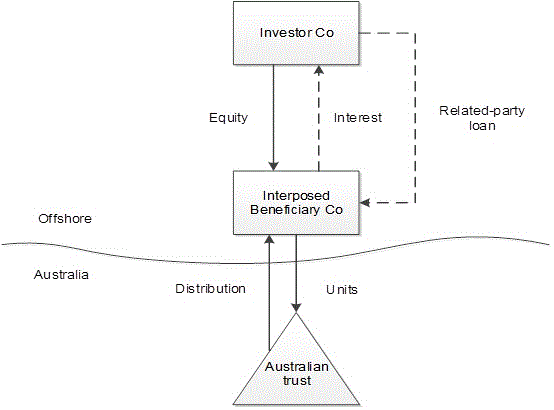The ATO is concerned with arrangements using offshore related entities to facilitate the avoidance of interest withholding tax in Australia.
It outlined these concerns in Taxpayer Alert 2020/3.
What arrangements attract the ATO’s attention?
The arrangements typically involve non-resident interposed beneficiaries of Australian trusts deriving Australian-sourced distribution income and deducting interest expenses from related-party debt against that income. For example (from TA 2020/3):
- Interposed Beneficiary Co enters a loan arrangement with its parent, Investor Co (a related-party loan).
- Interposed Beneficiary Co holds units in Australian trust.
- Australian trust derives income and distributes this income to Interposed Beneficiary Co at year-end.
- Its trustee pays tax at the Australian corporate tax rate of 30% when distributing to the non-resident, Interposed Beneficiary Co.
- Interposed Beneficiary Co then deducts interest expenses arising out of its the related-party loan, against the income distribution from Australian trust and this may give rise to a refund of the tax paid (subject to thin capitalisation and transfer pricing limitations).
- As neither Interposed Beneficiary Co nor Investor Co is an Australian resident, no Australian withholding tax is to be imposed on interest payments.
The ATO will focus on these arrangements which may be entered into to avoid interest withholding tax liability. The arrangement is set up for the related-party debt to be located offshore so that no interest withholding tax liability arises in Australia while a significant amount of interest deductions is claimed against the assessable Australian income.
What are the ATO’s concerns?
The ATO is not concerned with structures where deductible interest payments by a non-resident are merely incidental to what can be evidenced as ordinary and commercially appropriate business decisions.
The ATO’s focus is on arrangements with no commercial rationale, other than tax reasons, to support the interposition of a non-resident beneficiary or why the debt used for Australian business purposes should be borne by the non-resident beneficiary.
According to the ATO, other alarming features are:
- The effective tax rate on Australian-sourced income being minimal or zero
- The related-party debt being at a significant premium to referrable third-party debt, or the lending entity’s cost of funds and the arrangement falling foul of PCG 2017/4
- The beneficiary’s capital structure maximises debt deductions under the thin capitalisation rules, and
- The beneficiary is resident of a low or no-tax jurisdiction and/or a non-treaty jurisdiction.
What will the ATO do?
The ATO will review these arrangements and refunds claimed may be withheld until assurance is obtained concerning the relevant structures. The interest expenses can be reduced or rejected under Part IVA anti-avoidance provisions, transfer pricing rules, thin cap provisions and other rules.
What do these tax alerts mean?
This alert demonstrates that the ATO is clearly interested in international structures and cross-border flows. Given the increased information collected by the ATO through the International Dealings Schedule and Reportable Tax Position Schedule going forward, the ATO will be in a better position to understand the likely tax positions of taxpayers with similar transactions.
However, it also means that global tax strategy is critical and needs to be constantly revisited. As always, we need to clearly understand the commercial rationale of an arrangement in order to measure the tax risk.













